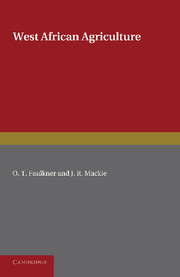Chapter 3 - Political Economy
from PART I - GENERAL
Published online by Cambridge University Press: 05 June 2016
Summary
There are practically no European planters in British West Africa, and relatively very few large estates under native ownership. Apart from the fact that the climate hardly permits of Europeans making a permanent home in the country, it has always been the policy of Government to keep the land for the people and to prohibit the alienation of any large blocks of land to any individual, African or foreign. The land is regarded as belonging to the local community, which, as a community, has absolute security of tenure and most of the rights of a freeholder.
The rights of the individual farmer within the community are determined by local “native law and custom”. This is generally unwritten and frequently exceedingly difficult to translate into terms that are readily intelligible to a European. Local native law and custom, moreover, naturally varies vastly from place to place; and it is also liable at times to very rapid changes in response to altered economic conditions. Since the law and custom is unwritten, the native courts which administer it may revise it, or may retard its changes. Experience shows, however, that the courts cannot permanently and entirely prevent the custom changing in response to changing conditions. Nor indeed can they attain complete consistency in their interpretation of the customs. Consequently it is extremely difficult to generalize about the rights of individuals. But it may be said that generally the individual farmer (or family) has a right, with some qualifications, to continue permanently to farm the land which he uses regularly. But apparently it is also a principle of native law and custom that every adult married male of a village, or whatever the communal unit may be, has an equal right to the use of a piece of land. If, therefore, the population of a village is already large enough to use all its land, and the population of married males increases by one, some readjustment is necessary, and has to be carried out by the village head or the village council of elders.
These two principles do not conflict, and present no difficulty, so long as land is plentiful. They seem to be preserved even when land is scarce, so long as the people are truly primitive; but they must inevitably fail, and have in fact failed, before the inroads of civilization.
- Type
- Chapter
- Information
- West African Agriculture , pp. 21 - 35Publisher: Cambridge University PressPrint publication year: 2013

